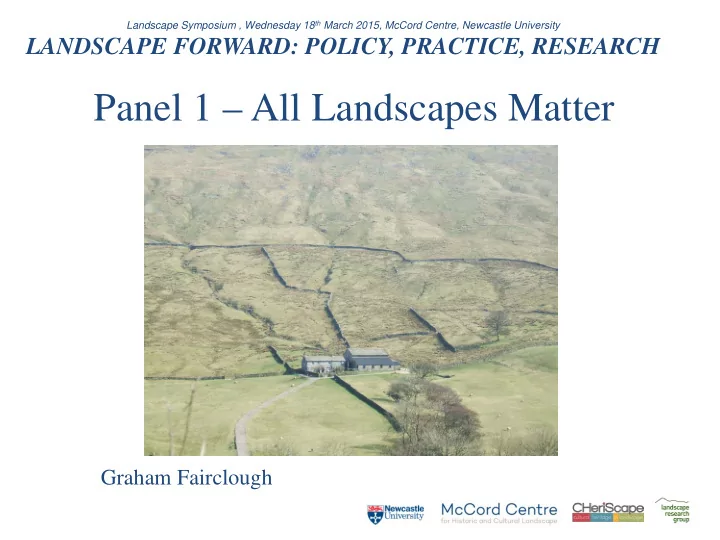

Landscape Symposium , Wednesday 18 th March 2015, McCord Centre, Newcastle University LANDSCAPE FORWARD: POLICY, PRACTICE, RESEARCH Panel 1 – All Landscapes Matter Graham Fairclough
LANDSCAPE FORWARD? WHICH WAY FORWARD? • I want to emphasise a) the human and cultural aspects, uses and relevance of landscape, and b) landscape as a unifying idea and frame. • Are we still too hung up on the idea of beauty and nature? Neither are the be-all-and-end all of landscape. • Images like this imply that landscape is about consumption. But landscapes are produced and constructed, not consumed.
What does ‘ All landscapes matter’ mean? Taken literally, it might mean– Everywhere matters to someone, usually(?) those who live there, sometimes others; Or All types / categories of landscape matter But why, how do they matter?
Neither of those meanings really say why landscape matters • So we resort (as for example in the consortium document) to formulations such as its benefits for health, recreation etc, and other affordances and uses, its aesthetic value, and so on. • But policy focuses on special areas, which are not everywhere ; nor are they every when, but merely holidays, days off. • Do people not live in landscapes the rest of the time? Which matters most, everyday or a few days?
Understanding what ‘every landscape matters’ means should also include more everyday experiences: • Senses of belonging, identity, place etc that are usually collective, shared • The simple fact that people create landscape physically and perceptually wherever they are, i.e. landscapes matter because in a way they are us. • If global (and local) problems have cultural causes, then the solutions must be cultural; in other words the solutions are found within the arena of landscape not of environment
Landscape as object or as subject Might it be more productive, politically and philosophically, to move from outside to inside? The outside view, consumption Inside views, production, whether romanticised or not
We no longer labour day in day out on the land, but we still use it, profit from it, work it, whether its green or covered in buildings. • The link between people and land through collectivity, through work, through perceptions adds the ‘-scape’ to land • In so doing it gives the concept of landscape a power of action and persuasion that exceeds that of other approaches • Should we aim for action ‘within or around landscape’, not action about landscape ; as others have said, planning, action ‘ through ’ not ‘ for ’ landscape • We should move ‘inside’ ........
And inside not as individuals but as a society or a community • Commons; community Landscape defined as communal and collective organisation, the oldest conception of landscape (Ken Olwig’s ‘substantive nature of landscape’), landscape as community, to set alongside our conception of landscape as picture, or more recently as other species’ habitat • Commoning was a way to share resources; why not still? Commons still exists, it’s what the ‘public realm’ is to landscape in towns and cities. • Partnership is the key word in the HLF’s ‘Landscape Partnerships’ and ‘landscape’ might be said to be ‘simply’ the medium or the mechanism
Imagine the collectivity that produced this system for sharing scarce water -
Conversely, too much water but no landscape approach ... Somerset Levels and the Thames, 2014, when things go wrong, as they often do without landscape (sustainable, culturally- as well environmentally-informed, collective with conflicts confronted) approaches
Landscape is cultural in the widest senses of that word. It can be used to show realities and possibilities, to change ideas ‘The Allegory of Good and Bad Government‘, Ambrogio Lorenzetti, 1338 - 1339, Siena. Untitled (?), Anonymous, Cordoba pre-2010
And yet, in 2015, the Back in 2011 – message to (incoming) POSTNOTE 380 governments, couched (Parliamentary Office of Science and Technology) mainly in terms of protecting nature by another name No. 376 Natural Capital Accounting No. 377 Ecosystem Approach No. 378 Ecosystems Service Valuation No. 379 Evidence Based Conservation No. 380 Landscapes of the Future
The terminology in the consortium leaflet does not fit the, everyday, living, active, transforming view of landscape I’ve mentioned; instead landscape is portrayed as: a) fragile - ‘(to) treasure our landscape’, ‘unique’, ‘threat’ • b) elsewhere - ‘mountains (etc) ..to ... parks in urban areas’ • c) other (external to us) - ‘what action (is needed) to achieve’ the • valuation of landscape d) an object not a process - ‘planning for landscape’ – why not • ‘landscape planning for .. social cohesion, human development, employment etc’ I worry that the assumptions behind such words are not helpful. They separate people from ‘all’ landscapes; are we arguing back to front? Hence, an uphill struggle?
ELC, 2000 SPB Landscape, 2010 Coming from people ; Landscape’s Communities; (potential) A tool not an object; integrative Into mainstream policy. power in research Faro Convention, 2005 ‘.. The value of cultural heritage for 2015 society’ Heritage as process; Heritage as rights and responsibility; Communities of heritage.
Landscape as a unifying frame? • How does landscape relate to ecosystem services, sustainability, or even the old standby, ‘countryside’ • Does landscape offer something that they don’t? • Is it more useful than those? • Is it stronger because it is concerned firstly with people, with society and with cultures?
In terms of ‘policy’ is this the closest the UK has got? From the Scottish Landscape Forum (?) 2010 “Landscape, therefore, encompasses all the physical elements of the environment that surrounds us – but it is people’s experiences and perceptions that turn surroundings into landscape.”
Ultimately, landscape is not about nature, or environment, or beauty, … it’s about people, their past and future actions, imagination and aspirations - their culture, in other words … and as Raymond Williams wrote, culture is one of the two or three most complicated words in English usage
Recommend
More recommend